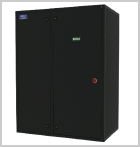Airedale adds to computer- room cooling units

Airedale International Air Conditioning has added 27 models to its SmartCool range. They have cooling capacities from 16 to 60 kW and increase the scope of the range to 16 to 180 kW to meet an even greater range of IT cooling requirements — from small computer rooms to large data centres.
The new units reduce total capital expenditure by delivering greater air volumes than leading competitors to provide 6% more capacity per square metre. The new range also offers up to 17% more cooling per square meter compared with Airedale’s previous-generation precision air-conditioning systems.
Meeting Class A efficiency guidelines, SmartCool uses the latest components such as EC fans and controls technology to minimise operational costs.
The entire DX range comes with tandem/dual compressors and electronic expansion valves as standard for improved efficiency. Efficiency is further increased by using the latest EC plug-fan technology across the entire range.
There is the potential for more savings in energy costs when linked with an Airedale free-cooling chiller — typically over 50% in London.
Enhanced by smart control logic, optional dual control and dual power supply, SmartCool is designed to meet n+1 and 2n redundancy requirements.
Modular design and control logic allows easy increase of capacity when room load increases.







